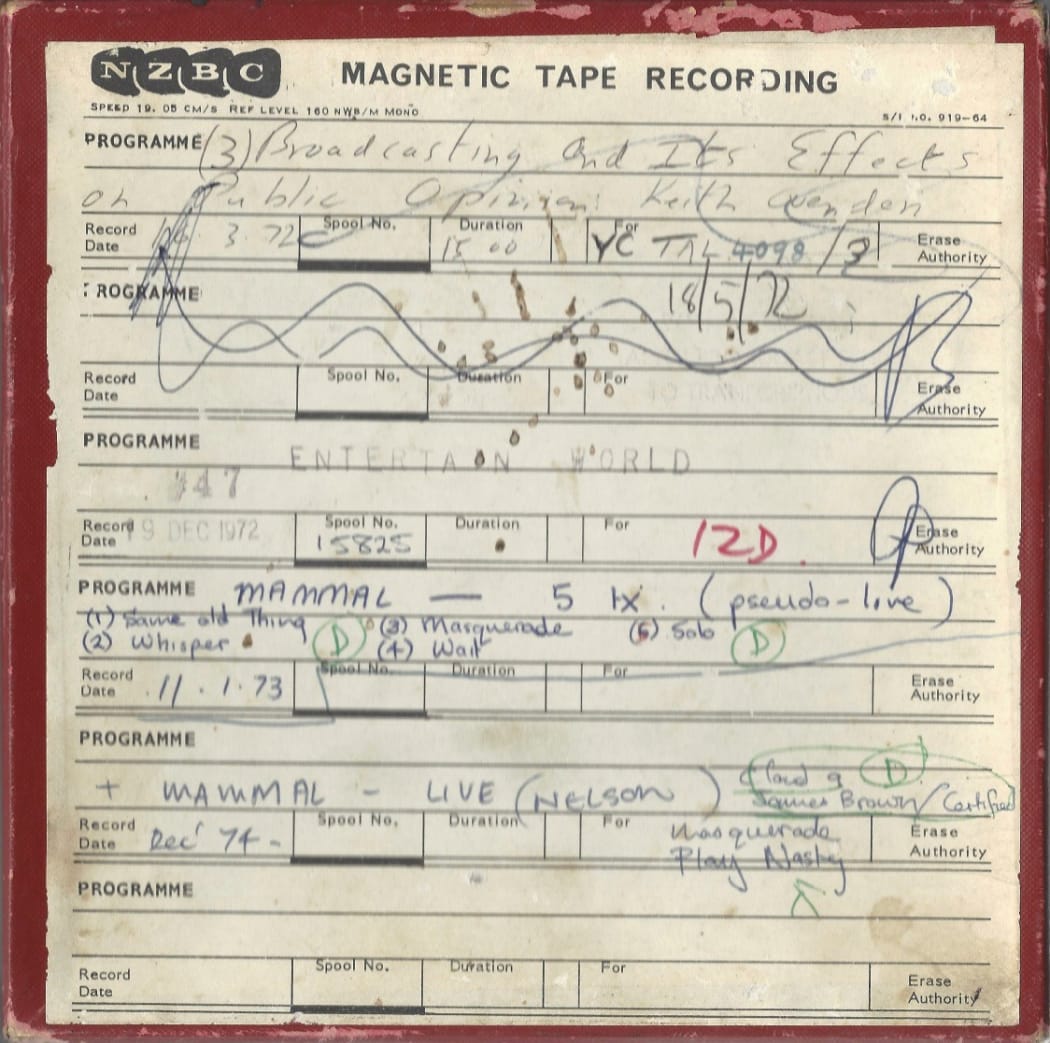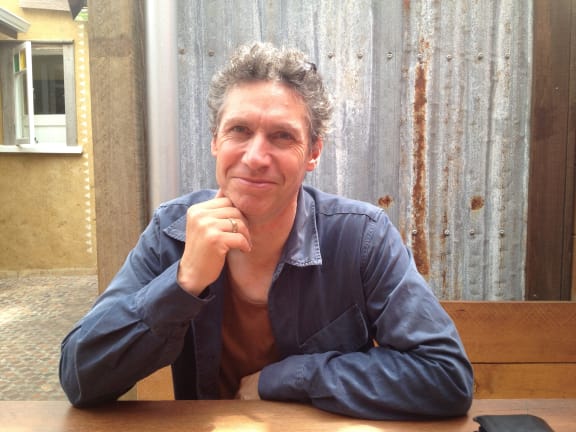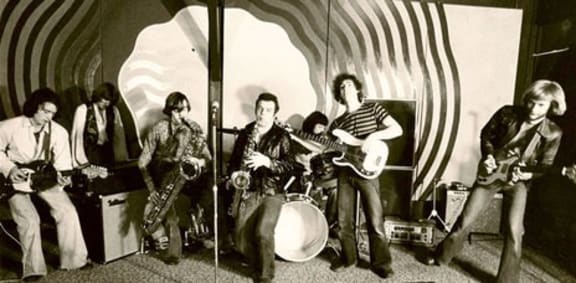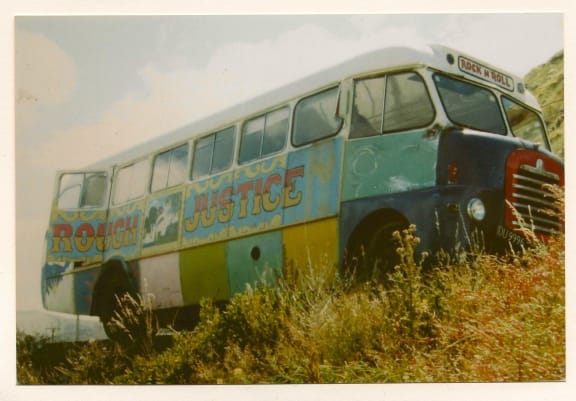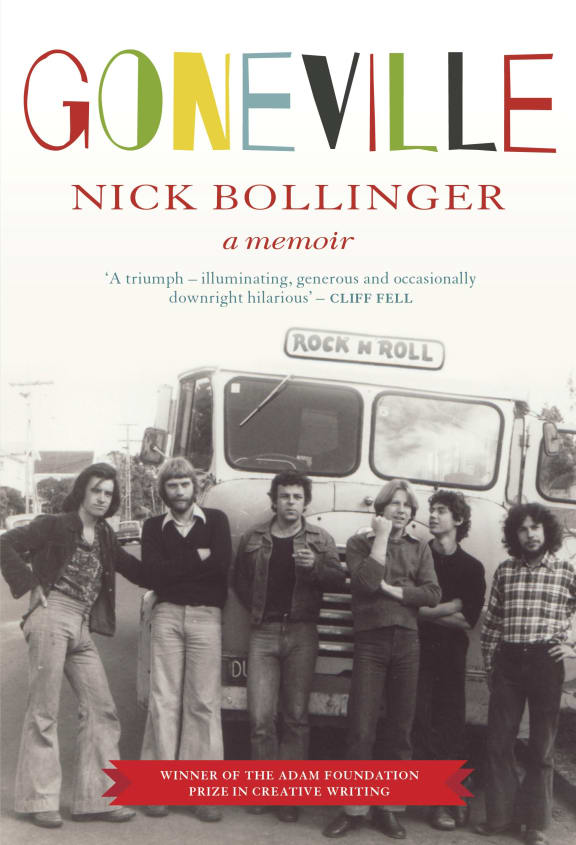Chapter 5.5 Hidden track: ‘Play Nasty for Me’

Nick Bollinger. Photo: Supplied.
Recording is a type of sorcery that allows you to travel through time. It can bring back the breath of the dead, or transport you to a lost moment in adolescence, as I discovered in 2014 when a reel of tape came into my possession. The container - an old box with splitting sides and a peeling label on which 'MAMMAL - LIVE (Nelson) Dec '74' was scrawled in biro - felt magical in my hands. Inside was a shiny brown tape, wound a couple of inches thick around a brittle plastic spool.
This artefact had belonged to Graeme Nesbitt. It was a recording of Mammal, a band of which he was sometimes referred to as manager. It captured them on a typical night away from their Wellington home, playing to an audience of … well, who exactly? It's hard to tell. There's no applause. Nobody shouts, 'Good evening, Nelson! Are you ready to rock?' so we never know who might have shouted back.
At one point a passing punter finds the microphone that's being used to make the recording - I see it positioned on a solitary stand somewhere in the centre of an old wooden community hall - and, wrapping his entire mouth around its bell, issues a series of primal screams that for maybe twenty seconds almost entirely cancels out the sound of the band. Finally he roars out his only intelligible words, 'MYYYY NAAAAME IIIIIS-', at which point someone - I'm guessing Nesbitt - tears the mic away from him, and with it his identity. The band, now in the midst of a stratospheric instrumental, becomes audible again.
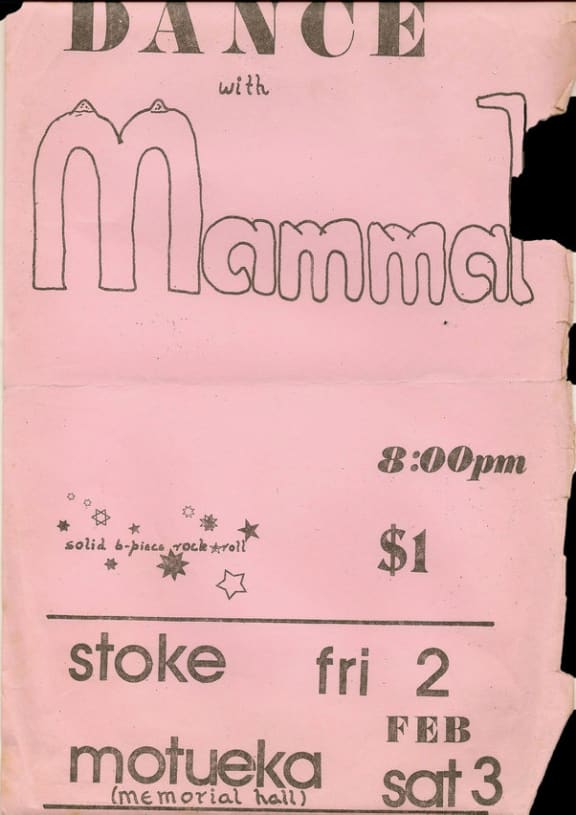
Flyer for Mammal in Stoke & Motueka, 1973 Photo: Rick Bryant collection, courtesy of AudioCulture
I was not in the audience that night in Nelson and yet the sound was strangely and instantly familiar. It was a song I had last heard so long ago I had come to believe I had dreamed it, like the reunion of The Beatles I had watched from the side of the stage until the alarm clock woke me up. Or maybe I had misheard it, and the melody and lyric that had faded in and out of my memory for forty years were quite different from what had actually been sung. The truth is I had never been able to recall many of the words or even much of the tune. Mostly it was just a refrain I had heard at a rock show in the Union Hall one Friday night in my early teens: Play nasty for me… And here it was, on the tape.
No wonder the memory was dreamlike. The song itself is a dream. It has its own dream logic in which one place can suddenly become another, and the most improbable group of characters can find themselves in the same story.
It starts out as an old-time country song, a two-step dance tune in attempted four-part harmony. 'Well I'm only the back door to the motel of your heart,' groan the singers, tired and off-key, as though it's three in the morning at the Goneville RSA and there are just two couples shuffling around the dancefloor, clinging to each other to stay upright, and a drunk sprawled out with his head in the bass drum, and the bar manager has told the band that if they want to get paid they've gotta play one more song but if it isn't 'Ten Guitars' then it better be something everyone knows. It is neither, although it could be one of ten thousand country laments.
Well you trampled on my feelings
And you walked across my pride
Now the maître d' has drawn the drapes
On the emptiness inside
And the switchboard that connects your heart to mine
Has broken down somewhere along the line
And the old-time band ignores my heartfelt plea
'Hey fella…
Play nasty for me'
On that last line something unexpected happens. There is a scream, a howl of electricity from centre stage, and the RSA is suddenly a psychedelic ballroom. Robert Taylor, Mammal's lead guitarist, is playing nasty. His Stratocaster screams in torment, while somewhere in the background the refrain continues, now a raucous affirmation:
Play nasty for me!
The sleepy country song was just a bluff. The band is wide awake and firing riffs like rockets. And yet this part of the song turns out to be also a bluff. It gives way to a wistful melody sung in half-time:
Homer standing by the plough
He'd go home but he don't know how
Homer? Now what is Homer doing here? This song, in its first three minutes, has already insisted it won't be tethered to the verse-chorus structure of the typical pop song but can and will go anywhere. Now the appearance of the old Greek bard is suggesting not merely a detour but an odyssey. This is borne out over the next twenty-five minutes as this single song journeys through surf music, heavy metal, space jazz, bucolic folk, always trying to get home to that refrain:
Play nasty for me!
In 1974 'Play nasty for me' was more than just a memorable hook in a strange song. It was a pop-cultural joke that the audience that Nelson night would surely have smiled at. Play Misty for Me, a film that starred Clint Eastwood and also marked his debut as a director, had recently screened in New Zealand picture theatres. It told the story of a disc jockey stalked by an unhinged fan who obsessively requests the old Errol Garner tune 'Misty'. Working musicians in New Zealand could relate to the disc jockey: they were often subjected as to such demands from drunken audience members. Steve Hemmens, Mammal's first bass player, told me about the night a man wielding a bottle strode up to the bandstand, stood so close they could smell his alcoholic breath, and demanded, "Play 'Help!' or you'll need it."
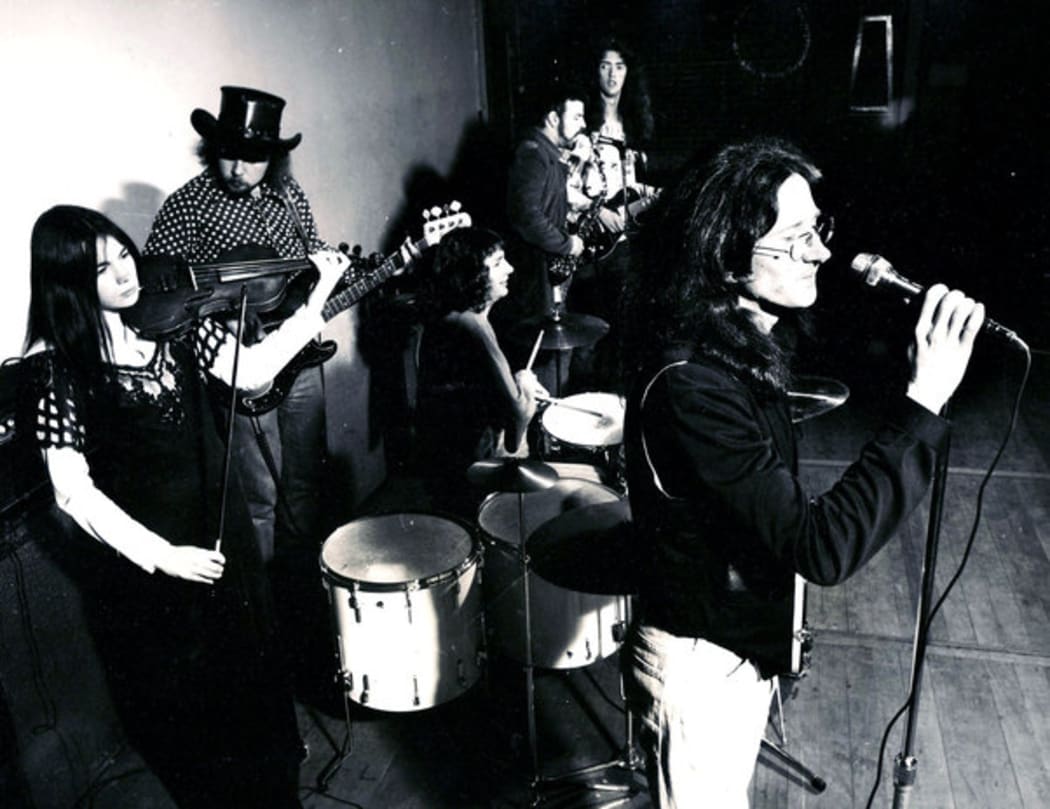
Mammal, 1974. Left to right Julie Needham, Mark Hornibrook, Kerry Jacobson, Rick Bryant, Robert Taylor, Tony Backhouse Photo: Rick Bryant collection, courtesy of AudioCulture
Back in the Nelson hall, 'Play Nasty for Me' fills with characters who might be refugees from Bob Dylan's 'Desolation Row'. Homer meets Surfer Joe as Mammal drummer Kerry Jacobson strikes up a pounding tom-tom beat straight off a Surfaris' single, while somewhere a trumpet begins to play 'Oh Mein Papa', as though a bewildered Eddie Calvert has stumbled into the hall and, not realising he is on the wrong stage, whipped out his horn and launched into his 1954 hit.
Calvert was an English trumpet player and all-round entertainer whose successful career had been eclipsed in the 1960s by the rise of pop groups such as The Beatles. But the beat boom wasn't his only bugbear. He was also a vocal opponent of Harold Wilson, Britain's Labour prime minister. By the end of the decade he had decamped to South Africa, where he recorded a version of the hymn 'Amazing Grace', retitled 'Amazing Race' in tribute to Ian Smith's racist Rhodesian government. Around the time of this odious ode, Calvert was hired by Richard Holden, New Zealand Breweries' entertainment manager, to undertake a national tour. He would perform exclusively in taverns booked by Holden.
On the recording it is Mark Hornibrook, Mammal's bass player and former National Youth Orchestra trumpeter, who is blowing the horn, but the fact Calvert was touring the country just when Mammal were traipsing through the backblocks is one of those coincidences on which the surreal world of 'Play Nasty for Me' is built.
We then hear a singer, probably Tony Backhouse, joining the chorus of 'Oh Mein Papa' in a full fruity tenor, like a drunken Eddie Fisher, whose vocal version of the same song had been a hit just a year before Calvert's. Eventually the two Eddies realise they are in the wrong song, the wrong city, the wrong universe, and head for the exit as Robert Taylor launches into a twanging riff reminiscent of Dick Dale, King of the Surf Guitar, which he concludes with a long scrape down the E-string, aimed at driving these interlopers out the door. Things gradually settle into a circular sequence of chords as Taylor solos, now using his wah-wah pedal to lend his notes a snarling tone that says, 'Fuck off, and don't come back!'
Musical worlds continue to collide and collapse into each other. Guitar menace dissolves into smooth Buffalo Springfield-style harmony, which is in turn overpowered by rock-a-boogie as someone begins to wail the white man's blues, until the whole thing unwinds again into cacophony. Strings bend and squeal and a saxophone shrieks like a cat in heat. 'It must be all them drugs they are taking,' mutters what might be a bewildered onlooker but is in fact Rick Bryant. Hornibrook, now back on bass, lets his fingers wander abstractedly about the fretboard. Guitars chime and familiar chords start to emerge from the murk. It's that old chorus again, although no one is singing it now. One of the guitars insinuates the 'Play nasty' riff and we're back into the theme for a few bars. There's another scream, a few more stanzas of four-part harmony, guitars again, with Taylor accelerating his solo until it soars. Someone starts playing the riff of The Beatles' 'Day Tripper', which only spurs Taylor on. And then, with a final purgative howl, Bryant vomits out the chorus one last time.
Iwantyoutoplaynastyformenastyformenastyforme
yayayyayyarrrghhhh…
In a heroic climax, Kerry Jacobson pummels his drums in a series of John Bonham-style ba-da-la-bump-ba-da-la-bumps and the song comes to an end, followed by … nothing. Twenty years of popular music - if not the entire history of lyric poetry, from Homer to Lennon - have flashed past in twenty-five minutes and no one seems to have noticed. The silence that follows could almost be the story of New Zealand rock in the early '70s. While the Breweries circuit hosted covers acts, showbands and faded offshore entertainers such as Eddie Calvert, original groups were forced to create their own circuit: provincial halls, university campuses, unlicensed clubs, occasional festivals, street parties. Little of their music ever found its way on to disc.
'Play Nasty for Me' is sui generis, a singular, extraordinary piece of work. No record was ever released, no studio recording ever made. There is nowhere on the planet, other than a half-empty hall in Nelson that night in 1974, where you would have heard this. It was the age of the rock epic. British prog-rock groups such as Pink Floyd and Yes were creating suites that took up entire sides of albums, but 'Play Nasty for Me' had little in common with these. What it did resemble - slightly - was the early work of Frank Zappa and The Mothers of Invention, full of collage and jump-cuts, or The Beatles, whose 'Happiness Is a Warm Gun' packed a genre tour of folk, hard rock and doo-wop into three minutes. It was a dialectic of pop, pitched from a place at the bottom of the world, upside down in the middle of nowhere, so far off the map that normal rules didn't apply. It could have happened only somewhere the stakes were so low that a band, suddenly realising it could do anything it liked because nobody was watching and nobody cared, grasped that freedom with the full strength of its imagination and created a work of art that would be almost forgotten for forty years.
The tape seems to have ended. All is silent except for the gentle swishing of the spool. Then, as if from the far end of a cave, can be heard shouts, shuffling, a few desultory claps. Who were these people? Did they know what they had witnessed? Rick Bryant mutters just off mic, 'Goodnight. See you later. Thanks for sticking round,' and the tape runs off its spool.
- Extract from Goneville by Nick Bollinger, published by Awa Press. Available from 16 December 2016.
